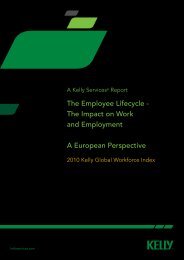Poland as the destination for Shared Services Centers
Poland as the destination for Shared Services Centers
Poland as the destination for Shared Services Centers
You also want an ePaper? Increase the reach of your titles
YUMPU automatically turns print PDFs into web optimized ePapers that Google loves.
7 .6 .3 Major rules and regulations of employment<br />
<strong>Poland</strong> <strong>as</strong> <strong>the</strong> <strong>destination</strong> <strong>for</strong> <strong>Shared</strong> <strong>Services</strong> <strong>Centers</strong> 87<br />
• Working Hours<br />
The Labor Code provides that <strong>the</strong> hours of work should generally not exceed 8 hours per day<br />
and approximately 40 hours per 5-day working week in an ”adopted reference period” not<br />
exceeding 4 months. An employee should not work more than approximately 48 hours a week,<br />
which means that 8 hours of overtime is allowed per week. Moreover, an employee in principle<br />
is entitled to at le<strong>as</strong>t 11 hours of uninterrupted rest every day and to at le<strong>as</strong>t 35 hours of<br />
uninterrupted rest each week. There are, however, some exceptions to <strong>the</strong> above rules.<br />
An employee shall receive additional remuneration <strong>for</strong> overtime work. Never<strong>the</strong>less, such<br />
persons <strong>as</strong> managers and chief accountants may be, in principle, employed beyond normal<br />
working hours without being entitled to additional compensation.<br />
An employee is also entitled to a day off, if <strong>the</strong>y are ordered to per<strong>for</strong>m overtime work on<br />
Sundays, public holidays, or o<strong>the</strong>r holidays. For a day off not granted, <strong>the</strong> employee is entitled<br />
to additional compensation <strong>for</strong> overtime.<br />
• Remuneration<br />
Remuneration is usually negotiated between <strong>the</strong> employer and employee, unless it is defined<br />
in a collective labor agreement. The Labor Code requires employers employing twenty or more<br />
persons to adopt remuneration rules, unless <strong>the</strong>ir employees are covered by collective labor<br />
agreements regulating remuneration and o<strong>the</strong>r employment benefits.<br />
Every year, <strong>the</strong> Minister of Economy, Labor and Social Policy determines <strong>the</strong> minimum amount<br />
of a monthly gross remuneration – <strong>for</strong> 2009 it is PLN 1,276. B<strong>as</strong>ic remuneration must be paid<br />
at le<strong>as</strong>t once per month, unless <strong>the</strong> Labor Code permits exceptions.<br />
By virtue of <strong>the</strong> l<strong>as</strong>t amendment of <strong>the</strong> Civil Code, lifting <strong>the</strong> limitations of settling contracts<br />
solely in Polish currency, remuneration does not need to be determined and paid in Polish Zloty.<br />
• Holidays<br />
An employee is entitled to an annual uninterrupted paid holiday (minimum 14 calendar days).<br />
The employee may not renounce his/her right to <strong>the</strong> leave. The duration of <strong>the</strong> holiday depends<br />
on <strong>the</strong> total time of <strong>the</strong> employee’s current and previous employment. The length of <strong>the</strong> holiday<br />
leave amounts to 20 days <strong>for</strong> employees employed <strong>for</strong> less than 10 years and 26 days <strong>for</strong><br />
employees employed <strong>for</strong> at le<strong>as</strong>t 10 years. It should be mentioned that <strong>the</strong> period of tertiary<br />
education is included in <strong>the</strong> total time of employment.<br />
• Limitations of claims against employee<br />
Employees are liable <strong>for</strong> any damage <strong>the</strong>y cause, up to a maximum sum equaling 3 months<br />
of <strong>the</strong>ir salary; this limitation does not apply to money or material <strong>as</strong>sets that have been<br />
entrusted to employees under a separate agreement.<br />
If an employee h<strong>as</strong> deliberately inflicted damage, <strong>the</strong>n she/he is liable <strong>for</strong> reparations up to <strong>the</strong><br />
full amount <strong>the</strong>reof.<br />
© 2009 KPMG Sp. z o.o. a Polish limited liability company and a member firm of <strong>the</strong> KPMG network of independent member firms affiliated with KPMG International,<br />
a Swiss cooperative. All rights reserved.










